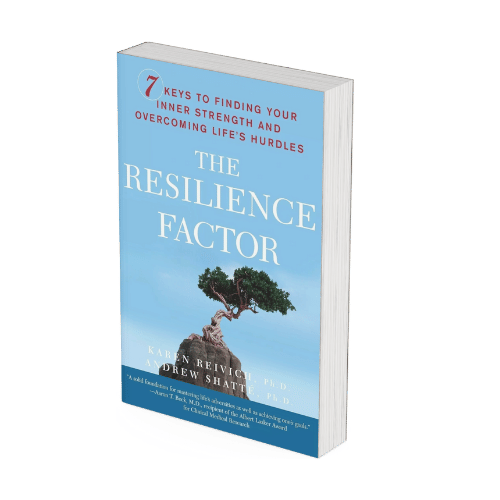The Resilience Factor
by Andrew Shatte and Karen Reivich
The Authors: Andrew Shatte and Karen Reivich
Andrew Shatte, Ph.D., is a leading expert in resilience and a research professor at the University of Arizona. He has devoted his career to understanding how individuals and organisations can build mental toughness and bounce back from adversity. His co-author, Karen Reivich, Ph.D., is a renowned psychologist at the University of Pennsylvania and an expert in positive psychology. Together, they combine decades of research in cognitive-behavioural therapy and resilience to develop practical, science-backed strategies for cultivating resilience in everyday life. Their work draws on the fields of psychology, neuroscience, and behavioural science, offering readers actionable insights grounded in scientific evidence.
Summary of “The Resilience Factor”
The Resilience Factor: 7 Keys to Finding Your Inner Strength and Overcoming Life’s Hurdles by Andrew Shatte and Karen Reivich is a comprehensive guide that explores the science of resilience and provides readers with practical tools to enhance their capacity to handle life’s challenges. The authors draw on years of research in positive psychology and cognitive-behavioural therapy to present a framework for understanding and building resilience.
The book is structured around seven key factors, each representing a critical component of resilience. These factors are:
- Emotional Regulation: Managing emotions effectively, especially in stressful situations, is foundational to resilience. The authors provide techniques for recognising and managing emotional responses to adversity.
- Impulse Control: Learning to pause and consider the consequences before reacting is crucial for making sound decisions, particularly under pressure. The book offers strategies to help readers develop greater self-control and avoid impulsive actions that could exacerbate challenges.
- Optimism: Shatte and Reivich highlight the importance of maintaining a positive outlook, even in difficult times. They discuss the role of optimism in resilience and provide exercises to help readers cultivate a more hopeful mindset.
- Causal Analysis: Understanding the root causes of problems is essential for developing effective solutions. The book introduces techniques for identifying and analysing the factors contributing to adversity, enabling readers to address challenges more effectively.
- Empathy: Understanding and connecting with others’ emotions is a critical component of resilience. The authors provide guidance on how to build empathy and foster stronger relationships, which are crucial for support during tough times.
- Self-Efficacy: Believing in one’s ability to influence outcomes is vital for resilience. The book discusses ways to build self-confidence and develop a sense of agency in the face of adversity.
- Reaching Out: The final factor focuses on the importance of seeking help and expanding one’s support network. The authors emphasise the value of reaching out to others and fostering a sense of community to build resilience.
Each chapter delves into one of these seven factors, offering practical exercises, real-life examples, and evidence-based techniques for building resilience. The book also includes a “Resilience Quotient Test,” which helps readers assess their current level of resilience and identify areas for improvement. Shatte and Reivich’s approach is both scientific and accessible, making The Resilience Factor a valuable resource for anyone looking to strengthen their ability to navigate life’s challenges.
My Thoughts on “The Resilience Factor”
Reading The Resilience Factor was a refreshing reminder of the importance of cultivating resilience in times of crisis and as a daily practice. Andrew Shatte and Karen Reivich have done an excellent job of breaking down the complex science of resilience into manageable and actionable steps. The book’s blend of cognitive-behavioural strategies and positive psychology aligns closely with many of the approaches I use in my practice, making it a valuable addition to the toolkit of any therapist, coach, or mental health professional.
One of the most compelling aspects of the book is its focus on emotional regulation as the foundation of resilience. In my experience, clients often struggle with emotional overwhelm when faced with adversity, and the ability to manage these emotions is crucial for effective problem-solving and decision-making. Shatte and Reivich provide practical exercises to help individuals recognise their emotional triggers and develop healthier responses.
The emphasis on causal analysis is another highlight of the book. Understanding the root causes of challenges is essential for developing practical solutions, and this is a concept I frequently explore with clients. By encouraging readers to dig deeper and analyse the factors contributing to their difficulties, the book promotes a proactive approach to problem-solving rather than a reactive one.
I also appreciated the book’s focus on self-efficacy and optimism. Believing in one’s ability to influence outcomes and maintaining a positive outlook can be powerful motivators for change. These concepts are particularly relevant in therapy, where clients often need to rebuild their sense of agency and hope after facing setbacks. Shatte and Reivich’s strategies for cultivating optimism and self-efficacy are practical and grounded in scientific research, making them highly effective tools for fostering resilience.
The book’s final chapter on reaching out and building a support network resonates deeply with my belief in the importance of community and connection. No one is an island, and relationships and support systems often strengthen resilience. The authors provide valuable insights into building and maintaining these connections, which I emphasise in my work with clients and colleagues alike.
I Encourage Clients and Colleagues to Incorporate the Teachings from “The Resilience Factor”
- Focus on Emotional Regulation: Learn techniques to manage emotions effectively, particularly in stressful situations, to maintain clarity and make better decisions.
- Develop Impulse Control: Practice pausing before reacting to ensure thoughtful and constructive responses.
- Cultivate Optimism: To foster resilience and motivation, work on maintaining a positive outlook, even in challenging times.
- Engage in Causal Analysis: Encourage a deeper exploration of the root causes of challenges to develop more effective solutions.
- Build Empathy: Foster stronger relationships by understanding and connecting with others’ emotions, which can provide crucial support during tough times.
- Strengthen Self-Efficacy: Help clients build confidence in their ability to influence outcomes and navigate adversity.
- Reach Out and Build Support Networks: Emphasise the importance of seeking help and creating a sense of community to bolster resilience.
In Summary
The Resilience Factor: 7 Keys to Finding Your Inner Strength and Overcoming Life’s Hurdles by Andrew Shatte and Karen Reivich is a comprehensive and practical guide to building resilience. The authors provide a science-based framework that is accessible and applicable to a wide range of challenges, making this book a valuable resource for anyone looking to enhance their mental toughness and ability to overcome adversity.
The Resilience Factor
by Andrew Shatte and Karen Reivich
The Authors: Andrew Shatte and Karen Reivich
Andrew Shatte, Ph.D., is a leading expert in resilience and a research professor at the University of Arizona. He has devoted his career to understanding how individuals and organisations can build mental toughness and bounce back from adversity. His co-author, Karen Reivich, Ph.D., is a renowned psychologist at the University of Pennsylvania and an expert in positive psychology. Together, they combine decades of research in cognitive-behavioural therapy and resilience to develop practical, science-backed strategies for cultivating resilience in everyday life. Their work draws on the fields of psychology, neuroscience, and behavioural science, offering readers actionable insights grounded in scientific evidence.
Summary of “The Resilience Factor”
The Resilience Factor: 7 Keys to Finding Your Inner Strength and Overcoming Life’s Hurdles by Andrew Shatte and Karen Reivich is a comprehensive guide that explores the science of resilience and provides readers with practical tools to enhance their capacity to handle life’s challenges. The authors draw on years of research in positive psychology and cognitive-behavioural therapy to present a framework for understanding and building resilience.
The book is structured around seven key factors, each representing a critical component of resilience. These factors are:
- Emotional Regulation: Managing emotions effectively, especially in stressful situations, is foundational to resilience. The authors provide techniques for recognising and managing emotional responses to adversity.
- Impulse Control: Learning to pause and consider the consequences before reacting is crucial for making sound decisions, particularly under pressure. The book offers strategies to help readers develop greater self-control and avoid impulsive actions that could exacerbate challenges.
- Optimism: Shatte and Reivich highlight the importance of maintaining a positive outlook, even in difficult times. They discuss the role of optimism in resilience and provide exercises to help readers cultivate a more hopeful mindset.
- Causal Analysis: Understanding the root causes of problems is essential for developing effective solutions. The book introduces techniques for identifying and analysing the factors contributing to adversity, enabling readers to address challenges more effectively.
- Empathy: Understanding and connecting with others’ emotions is a critical component of resilience. The authors provide guidance on how to build empathy and foster stronger relationships, which are crucial for support during tough times.
- Self-Efficacy: Believing in one’s ability to influence outcomes is vital for resilience. The book discusses ways to build self-confidence and develop a sense of agency in the face of adversity.
- Reaching Out: The final factor focuses on the importance of seeking help and expanding one’s support network. The authors emphasise the value of reaching out to others and fostering a sense of community to build resilience.
Each chapter delves into one of these seven factors, offering practical exercises, real-life examples, and evidence-based techniques for building resilience. The book also includes a “Resilience Quotient Test,” which helps readers assess their current level of resilience and identify areas for improvement. Shatte and Reivich’s approach is both scientific and accessible, making The Resilience Factor a valuable resource for anyone looking to strengthen their ability to navigate life’s challenges.
My Thoughts on “The Resilience Factor”
Reading The Resilience Factor was a refreshing reminder of the importance of cultivating resilience in times of crisis and as a daily practice. Andrew Shatte and Karen Reivich have done an excellent job of breaking down the complex science of resilience into manageable and actionable steps. The book’s blend of cognitive-behavioural strategies and positive psychology aligns closely with many of the approaches I use in my practice, making it a valuable addition to the toolkit of any therapist, coach, or mental health professional.
One of the most compelling aspects of the book is its focus on emotional regulation as the foundation of resilience. In my experience, clients often struggle with emotional overwhelm when faced with adversity, and the ability to manage these emotions is crucial for effective problem-solving and decision-making. Shatte and Reivich provide practical exercises to help individuals recognise their emotional triggers and develop healthier responses.
The emphasis on causal analysis is another highlight of the book. Understanding the root causes of challenges is essential for developing practical solutions, and this is a concept I frequently explore with clients. By encouraging readers to dig deeper and analyse the factors contributing to their difficulties, the book promotes a proactive approach to problem-solving rather than a reactive one.
I also appreciated the book’s focus on self-efficacy and optimism. Believing in one’s ability to influence outcomes and maintaining a positive outlook can be powerful motivators for change. These concepts are particularly relevant in therapy, where clients often need to rebuild their sense of agency and hope after facing setbacks. Shatte and Reivich’s strategies for cultivating optimism and self-efficacy are practical and grounded in scientific research, making them highly effective tools for fostering resilience.
The book’s final chapter on reaching out and building a support network resonates deeply with my belief in the importance of community and connection. No one is an island, and relationships and support systems often strengthen resilience. The authors provide valuable insights into building and maintaining these connections, which I emphasise in my work with clients and colleagues alike.
I Encourage Clients and Colleagues to Incorporate the Teachings from “The Resilience Factor”
- Focus on Emotional Regulation: Learn techniques to manage emotions effectively, particularly in stressful situations, to maintain clarity and make better decisions.
- Develop Impulse Control: Practice pausing before reacting to ensure thoughtful and constructive responses.
- Cultivate Optimism: To foster resilience and motivation, work on maintaining a positive outlook, even in challenging times.
- Engage in Causal Analysis: Encourage a deeper exploration of the root causes of challenges to develop more effective solutions.
- Build Empathy: Foster stronger relationships by understanding and connecting with others’ emotions, which can provide crucial support during tough times.
- Strengthen Self-Efficacy: Help clients build confidence in their ability to influence outcomes and navigate adversity.
- Reach Out and Build Support Networks: Emphasise the importance of seeking help and creating a sense of community to bolster resilience.
In Summary
The Resilience Factor: 7 Keys to Finding Your Inner Strength and Overcoming Life’s Hurdles by Andrew Shatte and Karen Reivich is a comprehensive and practical guide to building resilience. The authors provide a science-based framework that is accessible and applicable to a wide range of challenges, making this book a valuable resource for anyone looking to enhance their mental toughness and ability to overcome adversity.
“The only way to make sense out of change is to plunge into it, move with it, and join the dance.”
Recent Thoughts
Stay with the Feeling
I see it every week in the clinic, and I recognise it in myself. The moment a feeling squeezes, we reach for the
When Your Feelings Flash Like a Dashboard Light
I still remember the first time the oil light glared at me during a late-night drive back from a workshop. My pulse spiked.




